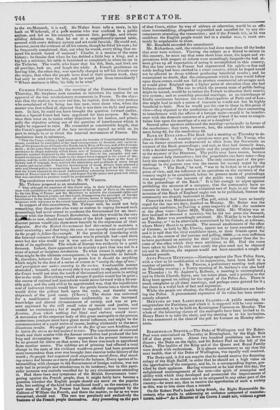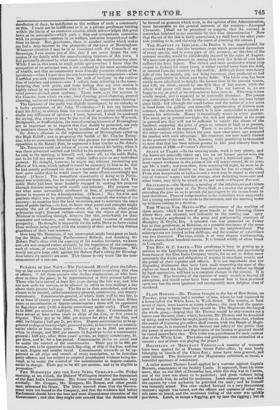BIRMINGHAM Drs . /ctn.—The Duke of Wellington and Sir Rober. Peel were
entertained on Thursday at Birmingham, by the High Bait liff of that great town. About two hundred gentlemen sat down to dinner ; the Duke on the right, and Sir Robert Peel on the left of the Chair. The healths of the King and of the Queen and Royal Family were drunk with enthusiasm. It is almost unnecessary to say that the next health, that of the Duke of Wellington, was equally well received.
The Duke said, it did not require that he should receive the flattering eulogy of the High Bailiff, in order that he should set a high value on the approbation of the company, and be, in a corresponding degree, gra- tified by their applause. Having witnessed as he had done this day, the enlightened encouragement of the arts—the spirit of enterprise and ability with which they developed and prosecuted the improvement of their resources, to an extent not to be surpassed in any other part of the country—he must say, that to receive the approbation of such a society as this, was to him more than a reward. On Sir Robert Peel's health being drunk, the Right Honourable Se- cretary, who excells in addressing an audience composed of =masc. turns, As a Minister. of the Crown I could not, without a great _ dereliction of duty, be indifferent to the welfare of such a community as this. I could not be indifferent to it as a private gentleman residing
within the limits of an extensive district, which acknowledges this great town as its metropolis—which feels a deep and sympathetic connexion with its prosperity—rejoices in its welfare, and must languish and suffer from its decay. ,But, gentlemen, there is another motive which makes me feel a deep interest in the prosperity of the town of Birmingham. Whatever situation I may be in as connected with the Councils of my
Sovereign, I can assure you of this, that I can never forget the con- nexion of my family with the manufacturing interests of this town. I feel personally elevated by what tends to elevate the manufacturing class. While I see in this town so much public spir; t—when I know that the occupation of its principal men is not confined to the mere accumulation of wealth, and that no community more liberally promotes objects of be- nevolence—when I know that the arts here receive encouragement—when I seenhat you seek relaxation from the toils of business in the cultiva- tion of intellect and science—can I refrain from referring to the manu- facturing class with pride, and from feeling that my own station is highly raised by my connexion with it ?"—This appeal to the mecha- nical powers elicited great applause. There were, says the account in the Courier, from which we copy, loud cheering, great cheering, general cheering, universal cheering, continued cheering, tremendous cheering !
The harmony of the party was slightly interrupted, by an unlucky or a lucky expression of Sir John Wrottesley—" It was my intention (said Sir John) to abstain from the mention of any matter calculated to excite any difference of opinion : I trust, however, I shall be pardoned for saying, that whatever may be the zeal of the members for Warwick, Bridgnorth, or Staffordshire, the manufacturing interests of Birmingham are so important as to require that they should be protected, not only by members chosen by others, but by members of their own choice." Sir John's allusion to the representation of Birmingham called up the High Bailiff; and in proposing the health of Mr. Charles Tenny- son, who so strenuously laboured for that purpose for several sessions in opposition to Sir Robert Peel, he expressed a hope similar to Sir John's.
Mr. Tennyson could not refuse of course to mount his hobby, when it was there presented saddled and bridled to his acceptance. He owed it, he said, to the meeting, to himself, and, above all, to the noble Duke, not to let fall any expression that might inflict pain on any individual present. He thought, however, he might say, without recounting any efforts of his own, which indeed it would be unseemly in him to do, that he had merely performed his duty as a member of Parliament ; and he now gave notice that he would renew the same efforts unceasingly and firmly. (Cheers.) The immediate opportunity of doing so in Parlia- ment was withdrawn, but he would prosecute them in a wider field. The noble Duke had been most laudably engaged in making his progress through districts teeming with wealth and industry. His purpose was not what some unworthily attributed to him, of propitiating public favour in support of his Administration. (Cheers.) No; his wise and Patriotic object was, by personally inquiring, to consult the wishes of the country—to examine into the local necessities, and to ascertain the exact state of public feeling,—in fact, to know what power and energies might require the aid of Government—atiove all, to ascertain what public grievances might demand redress—such was the object of this great Minister in travelling through districts like this, remarkable for their commerce and industry, and forming the grand resource of national prosperity. He thought it impossible for the noble Duke to have visited them without being struck with the anomaly of their not having distinct guardians of their vast interests.
How long Mr. Tennyson, if not interrupted, might have gone on lautl ing the Duke, advocating Parliamentary Reform, and breaking Sir Robert Peel's shins with the capering of his wooden favourite, we know
not—he was stopped rather abruptly by the impatience of the company, each of whom, of course, had his hobby as well as Mr. Tennyson. We would not give large odds against Sir Robert Peel's sitting for Birming- ham before six months are over. This dinner is very much like the com- mencement of a canvass.



























 Previous page
Previous page